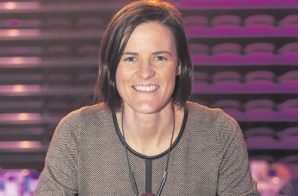Role: Nations Director
Company: Creative & Cultural Skills
Track Record: It is part of Sara Graham’s role with Creative & Cultural Skills to encourage young people to consider a career in the creative industries.
HOW I BECAME A CREATIVE SKILLS MANAGER
Give a brief outline of your career to date.
Creative & Cultural Skills plays a vital role in giving young people the chance to have a rewarding career in one of Northern Ireland’s fastest growing sectors, the creative industries.
My role includes overseeing our work across Northern Ireland, Scotland and Wales and involves managing our National Skills Academy for Creative & Cultural – a network of creative employers and educators, and running the NI Creative Employment Programme, a scheme supported by the Arts Council for Northern Ireland Lottery Funding to help employers create jobs for young people wanting to build a career in the sector.
Before that, I worked in training, including as a consultant at ITS (International Training Service) and OPT Ltd, and led a programme of museum and heritage skills training with the Northern Ireland Museums Council.
What was your favourite subject at school?
Geography.
Did you go on to further/higher education, if so what did you study and where?
I studied at Queen’s University – BSc Psychology and an MSc Occupational Psychology.
How did you get into your area of work?
By taking opportunities as they came along. In every job I learned new skills that helped lead to the next.
Is this what you always wanted to do?
No. This is definitely not a job you plan for. I had no idea that this type of role could exist, but I think there are a lot of jobs like that – jobs which are hard to quantify, don’t have a career path and don’t fit neatly into any job description.
Were there any particular essential qualifications or experience needed?
The MSc in Occupational Psychology has given me a great grounding in understanding skills and training. Previous roles meant I had good experience in project and client management, training and development and the ability to work independently.
What are the main personal skills your job requires?
Partnership working is fundamental to everything we do, so building trust and good working relationships with industry partners, government stakeholders and education partners is really important.
As with so many creative industry jobs, flexibility and tenacity are important, as is a willingness to learn.
What does a typical day entail?
No such thing. At the moment we have an amazing scheme for creative employers called the NI Creative Employment Programme, and one of my favourite things is the chance to talk to employers about employing an apprentice or intern and giving a young person a chance to gain employment for the first time in the sector.
My work can also include meeting with government about their investment in creative skills and education, running an industry project for our National Skills Academy Colleges or a creative careers event for teenagers.
What are the best and most challenging aspects of the job?
Best is the variety of my role and that I get to work with deeply committed and talented creative professionals who genuinely want to work with us to help create opportunities for young people.
The most challenging is making the budgets work and keeping the charity sustainable.
Why is what you do important?
The creative industries sector is one of the fastest growing in the UK. There are huge opportunities for young creative people looking to build a career, and self employment is the norm. However, as a sector we don’t have a well-tested roadmap that leads from courses to qualifications to recognisable jobs. Careers advisors are typically not equipped to talk about the variety of jobs in the creative sector, and there is also still the misconception amongst parents and schools that a creative career pathway is ‘not a proper job’. Young people need support in navigating all of this.
What advice would you give anyone looking to follow a similar career path?
I don’t feel like I have a career path, I’ve worked hard, kept learning and taken opportunities when they’ve come along, and it’s brought me to this point.
For a young person looking to get into the creative sector I would advise them to make connections with people in industry at every chance they get – talk to them, listen and learn. Volunteer to build your experience and skills. Businesses in the creative sector are typically small. Employers are looking for passion, a strong work ethic and a willingness to roll up your sleeves and get stuck into all aspects of the business. We have a dedicated careers website www.ccskills.org.uk/careers which offers practical advice and guidance from industry professionals; it also posts information about job opportunities.
If you weren’t doing this what would you like to do?
I’d love to work with animals.
What is the one piece of advice you would give to yourself on your first day?
Work hard and be nice. It applies to everyone at every stage in their career.
Describe your ideal day off.
It will involve friends and eating… even better to have a week off and enjoy friends and eating whilst exploring a new country!
And finally, what’s the key to any successful job search?
Self-awareness is important – what are you good at and what do you enjoy? Subscribe to industry networks and follow organisations you would like to work for – they will always share job opportunities on their websites and social media.


